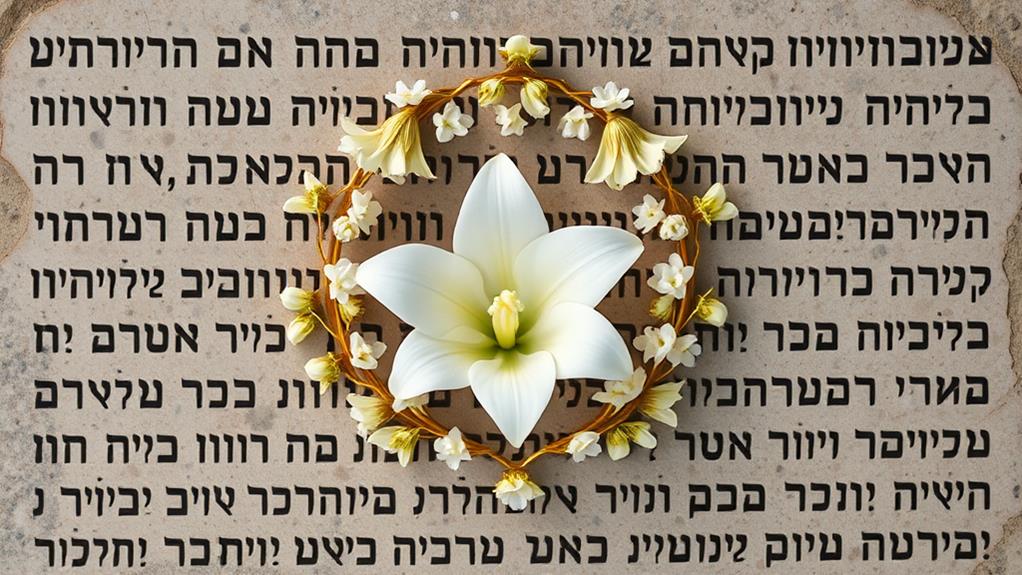Maria Name Meaning in the Bible
The name Maria, rooted in Hebrew and Christian traditions, symbolizes purity, spiritual wealth, and unwavering commitment to faith. Derived from the Hebrew counterpart ‘Miriam,’ meaning ‘bitterness’ or ‘sea of bitterness,’ it also connects to the Egyptian term ‘meri,’ signifying ‘beloved’ or ‘wished-for child.’ In Christian theology, Maria represents faithfulness, obedience, and dedication to serving God, as exemplified by her iconic response, “Behold, I am the servant of the Lord…” Her pivotal role in the salvation story, from the Annunciation to the Nativity and beyond, offers a profound model of faith. Exploring her story further reveals deeper spiritual insights and the enduring legacy of her devotion.
Key Takeaways
- Hebrew Origin: The name Maria originates from the Hebrew name Miriam, symbolizing bitterness and spiritual wealth.
- Egyptian Influence: Maria is also influenced by the Egyptian term “meri,” meaning “beloved” or “wished-for child”.
- Biblical Significance: In the Bible, Maria represents purity, faithfulness, and obedience, particularly as the mother of Jesus.
- Spiritual Symbolism: The name Maria symbolizes spiritual resilience, commitment to faith, and divine love, reflecting qualities like those of the Virgin Mary.
- Cultural Significance: Maria is deeply rooted in Christian theology, embodying themes of peace, unity, and enduring popularity as a symbol of spiritual values.
Biblical Origins of Maria

The biblical origins of Maria trace back to its Hebrew counterpart, Miriam, which is deeply rooted in both Hebrew and Egyptian traditions. This name is believed to have originated from the Hebrew word “mry” or “mr” meaning “bitterness” or “sea of bitterness” and the Egyptian term “meri” signifying “beloved” or “wished-for child.” The cultural importance of Maria is profound, symbolizing purity and spiritual wealth through its association with Mary, the mother of Jesus, in the Christian tradition.
Additionally, the name embodies virtues of strength and resilience, similar to names like Ashley that reflect divine blessings and personal growth, emphasizing the connection to spiritual growth and transformation.
The name’s evolution reflects its universality, with variations such as Mary in Anglo-Saxon cultures and Mariam in Arabic cultures, each retaining its deep meaning. The appearance of Mary in the New Testament further strengthened the spiritual connotations of this name, making it one of the most significant and recognizable in the Christian tradition.
This universality makes Maria a unique name, combining tradition, history, and spirituality in a way that transcends cultural boundaries.
The name Maria is not just a personal name but also a reflection of the values and beliefs of those who bear it, embodying virtues such as sensitivity, empathy, and strong intuition.
Symbolic Meanings of Maria
Cultural significance plays a pivotal role in the religious interpretations of Maria. The name represents a profound commitment to faith and spirituality, often associated with the values of love, care, and protection.
In various cultures, the name Maria is seen as an embodiment of spiritual resilience and obedience, drawing inspiration from the biblical narrative of Mary’s life and her unwavering trust in God’s promises. Additionally, the name’s connection to themes of peace and unity resonates with the broader spiritual values found in biblical teachings.
The diverse meanings derived from its Hebrew origins, including “bitter,” “beloved,” and “rebelliousness,” further enrich the symbolism of Maria, reflecting a complex and multifaceted identity. This rich tapestry of meanings contributes to the enduring popularity of the name, making it a timeless and universal symbol of spiritual values and devotion.
Marriage and Spiritual Symbolism

Maria’s association with spiritual values extends beyond her individual symbolism, intertwining with broader themes of love and commitment in the context of marriage. The name Maria, deeply rooted in Hebrew and Egyptian origins, signifies a “beloved” and “wished-for child,” which plays a significant role in the spiritual context of marriage. This aligns with the notion of spiritual transformation and renewal, as Maria embodies the qualities of faith and hope that are essential in nurturing marital bonds.
In the biblical framework, marriage is seen as a sacred covenant, symbolizing a spiritual union between two individuals. The name Maria, associated with the Virgin Mary, embodies this concept of spiritual union and dedication. Here are three key points highlighting the connection between Maria and spiritual symbolism in marriage:
- Divine Favor: Maria, as the mother of Jesus, represents divine favor and spiritual guidance, emphasizing the importance of faith and obedience in marital relationships.
- Spiritual Union: The name Maria symbolizes a deep spiritual connection, reflecting the essence of a sacred covenant that transcends physical boundaries.
- Enduring Love: The story of Maria, through her unwavering love and devotion, exemplifies the enduring power of love in marriage, inspiring couples to cultivate a strong spiritual foundation.
The symbolism of Maria in the context of marriage underscores the importance of spiritual commitment and love.
Mary in Christian Theology
In Christian theology, Mary holds a pivotal role that extends far beyond her biblical narrative. She is not only the mother of Jesus but also a symbol of faithfulness and obedience. Mary’s significance in Christian beliefs is deeply rooted in her unwavering commitment to serving God and fulfilling His purpose for her life. Her faith journey, as depicted in the Bible, serves as a timeless model of spiritual resilience and obedience.
Biblical interpretations emphasize Mary’s role in the salvation story, from the Annunciation to the Crucifixion and Resurrection. Her humility and acceptance of God’s will, as expressed in her iconic response, “Behold, I am the servant of the Lord; let it be to me according to your word,” underscore her profound faith and trust in God’s promises.
Mary’s faithfulness continues to inspire believers through her intercession and maternal love. Her unique status as the Mother of God and her role in interceding for believers before her son highlight her enduring significance in Christian theology. Through her example, Christians are encouraged to emulate her steadfast faith and trust in God’s will, drawing inspiration from her unwavering devotion to serve God’s purpose.
The Annunciation: A Key Event

The Annunciation, a pivotal event in the biblical narrative, marks the moment when the angel Gabriel appeared to a young virgin, delivering a life-changing message that would set the course for human salvation. This divine message announced the conception of Jesus Christ, highlighting the central role of Mary, often referred to by her Latin name, Maria, in Christian theology. The significance of the name Maria can be seen as embodying themes of unwavering commitment and spiritual resilience, much like the qualities associated with the name William, which emphasizes divine protection and strong will the biblical significance of names.
The spiritual significance of the Annunciation is multifaceted:
- Divine Revelation: The Annunciation signifies the moment when God’s plan for human salvation was revealed through the angel Gabriel, underscoring the importance of divine communication.
- Virgin Birth: It emphasizes the miraculous nature of Jesus’ conception, reinforcing the belief in the divine intervention in human history.
- Mary’s Role: The event underscores Mary’s faith and obedience, setting her as a model for Christian devotion and spiritual courage.
The Annunciation stands as a cornerstone of Christian teachings, its narrative encapsulating the intersection of the divine and the human. This event is celebrated annually, commemorating the moment when humanity’s destiny was forever altered, guided by the divine plan for salvation. This pivotal event continues to inspire and educate, reinforcing the spiritual significance of the name Maria within Christian traditions.
Maria and Divine Favor
A figure of unparalleled devotion in Christian theology, Mary, often referred to by her Latin name, Maria, embodies the essence of divine favor through her unwavering commitment to God’s will. The biblical narrative of Maria is intricately woven with threads of divine grace, calling her to be the vessel through which God’s redemptive plan for humanity would unfold. The Annunciation, where Gabriel appeared to Maria, announcing her role as the mother of Jesus, marks a pivotal moment where divine favor is bestowed upon her, underscoring her incapacable acceptance with, “Behold, I am the servant of the Lord; let it be to me according to your word”.
Maria’s biblical significance is rooted in her role as the mother of Jesus, symbolizing purity, grace, and divine favor. Her life’s story, from the Visitation to the Crucifixion and Resurrection, reflects her unwavering faith and obedience, serving as a timeless model of spiritual resilience and devotion.
Through her story, we see the epitome of divine favor, as she is chosen for a role that transcends human understanding, embodying the profound meaning of embracing God’s will with humility and grace.
The Visitation: Mary’s Humility

- Prompt Obedience – Mary immediately obeys God’s instruction, showing her unwavering commitment to divine will.
- Selfless Service – By visiting Elizabeth, Mary demonstrates her willingness to serve others, embodying the spirit of meekness and humility.
- Gracious Heart – Her interaction with Elizabeth reveals a gracious and compassionate heart, reflecting the grace bestowed upon her by God.
This episode in Mary’s life underscores the importance of meekness and service. Her humility is not just a dispositional trait but a fundamental aspect of her connection with God.
Through Mary’s example, we learn the value of submitting to divine will and serving others with grace and humility. This spiritual equity enhances our relationship with God and our ability to receive divine favor.
The Nativity: Birth of Jesus
In this moment, Mary’s unwavering trust in God’s promises is exemplified by her willingness to embrace the challenges of her divine calling, even in the face of uncertainty and adversity. The Nativity scene not only highlights Mary’s pivotal role in the salvation story but also serves as a proof of her unwavering faith and dedication to God’s purpose for her life. Through her example, Mary inspires believers to trust in the Lord and remain faithful in all circumstances.
Her role in the Nativity becomes a beacon of hope, illuminating the path to deeper understanding and connection with God.
The Assumption: Maria’s Ascension

- Spiritual Upliftment: The Assumption symbolizes the ultimate honor bestowed upon Maria, reinforcing her status as a role model in Christian devotion. Her ascension serves as a proof of the transcendent power of faith and the divine recognition of her manifold virtues.
- Reinforcing Marian Devotion: The Assumption of Maria strengthens Marian devotion, highlighting her as a conduit to divine grace. This profound religious significance is celebrated widely, especially on August 15, during the feast of the Assumption of the Blessed Virgin Mary.
- Eternal Legacy: The Assumption secures Maria’s eternal legacy, citing her as an emblem of purity and spiritual abundance. This event encapsulates the core principles of Christian spirituality, reinforcing Maria’s status as a central figure in Christian theology.
Through her ascension, Maria embodies the ultimate spiritual upliftment, inspiring generations to pursue higher values and spiritual development.
Maria: A Model of Faith**
In the biblical narrative, Maria exemplifies faith in divine guidance through her willingness to accept and fulfill God’s will, as seen in her humble yet profound response to the angel Gabriel during the Annunciation (Luke 1:26-38). Her faith also embodies the path of moral resilience, particularly in her unwavering strength during the Crucifixion and her subsequent joy in the Resurrection, demonstrating a steadfast commitment to her divine calling. Through her example, Maria inspires believers to embrace spiritual fulfillment by trusting in God’s promises and remaining faithful in all circumstances.
Faith in Divine Guidance
The biblical narrative presents Maria, particularly through the figure of Mary, the mother of Jesus, as a quintessential model of faith in divine guidance. Her journey is marked by profound trust and obedience to divine will, illustrating the transformative power of spiritual enlightenment and divine inspiration.
Key aspects of Maria’s faith in divine guidance include:
- Embracing divine intervention: Mary’s acceptance of the angel Gabriel’s announcement is a proof of her faith in God’s providence. Despite the mystery and challenge of her conception, she responds with unwavering trust: “Behold, I am the servant of the Lord; let it be to me according to your word” (Luke 1:38).
- Following biblical teachings: Mary’s actions are guided by her understanding of the scriptures. Her visit to Elizabeth and her participation in the presentation at the temple demonstrate her adherence to Jewish custom and her faith in God’s promises.
- Trusting through adversity: Mary’s presence at the Crucifixion and her participation in the early Church community highlight her enduring faith in God’s plan, even in the face of adversity.
Through Maria’s example, we learn the importance of submitting to divine guidance, embracing the unknown with faith, and trusting in God’s providence.
Embracing Spiritual Fulfillment
Study of Maria’s life, particularly through the biblical figure of Mary, the mother of Jesus, reveals a profound model of embracing spiritual fulfillment. The name Maria, deeply rooted in Hebrew and Latin traditions, symbolizes purity and spiritual wealth, making it a powerful emblem of faith and personal growth.
Maria, in its biblical context, embodies the virtues of care, love, and protection. Mary, as depicted in the New scripture, is a quintessential example of spiritual growth and personal transformation. Her unwavering faith and surrender to divine guidance serve as a beacon for those seeking spiritual fulfillment.
In embracing spiritual fulfillment, individuals can look to Maria as a guiding figure. Her story highlights the importance of humility, obedience, and trust in divine will. It is through these qualities that one can achieve profound personal transformation, leading to a deeper connection with spiritual principles.
The name Maria, as such, carries not only historical significance but also spiritual guidance, encouraging individuals to pursue a path of spiritual growth and development.
Path of Moral Resilience**
Embodying the essence of moral resilience, Maria, as exemplified by Mary, the mother of Jesus in the New Scriptures, presents a compelling model of unwavering faith and spiritual strength. Her path, marked by humility and obedience, invites us to explore the core elements of moral resilience and spiritual growth.
Key Elements of Maria’s Moral Resilience:
- Faith and Obedience: Maria’s acceptance of the divine will, despite the challenges and uncertainties it entailed, demonstrates her profound faith and obedience. This unwavering commitment sets a precedent for moral strength, inspiring a life of dedication and service to a higher purpose.
- Endurance and Sacrifice: Embracing the hardships and sacrifices that came with her role, Maria exemplifies the importance of perseverance and selflessness. Her journey underscores the value of endurance in the face of adversity, a critical component of moral resilience.
- Spiritual Anchor: Maria’s spiritual growth, grounded in her faith and devotion, serves as a robust anchor, providing stability and guidance through life’s trials. This spiritual foundation is essential for navigating the complexities of moral challenges and fostering a deeper level of resilience.
Frequently Asked Questions
Is Maria a Unique Name Across Cultures?
Maria is not a unique name across cultures, as it possesses profound cultural significance and popularity across various societies. Its historical origins in Hebrew, Greek, and Latin have spawned numerous variations, such as Maryam, Mariam, and Marie, underscoring its widespread use.
What Is the Etymological Origin of the Name Maria?
Like a thread weaving through tapestries, the name Maria’s etymological origin binds cultures together. It stems from the Hebrew name “Miryam,” meaning “bitter” or “wished-for child,” and reflects both its biblical significance and cultural variations across the globe.
How Does the Name Maria Differ in Various Languages?
The name Maria exhibits varied cultural and linguistic expressions across languages. Historically and religiously significant, its meanings span “bitter,” “beloved,” “rebelliousness,” and “wished-for child,” reflecting diverse interpretations in Latin, Greek, Hebrew, and Aramaic.
Is Maria Associated With Any Non-Christian Deities?
Amidst the tapestry of mythological origins, Mary’s image is sometimes entwined with pagan goddesses, such as Isis and Cybele, due to iconographic similarities and ancient religious syncretism, but her Christian significance remains understandably distinct.
Does the Name Maria Have a Specific Numerological Significance?
The name Maria holds significant numerological interpretations, particularly associated with the number 6, symbolizing love, compassion, and responsibility. Its biblical significance as the mother of Jesus further emphasizes themes of devotion and nurturing qualities.
Rare and Unique Biblical Names
- Selah Name Meaning in the Bible
- Sheena Name Meaning in the Bible
- Sybil Name Meaning in the Bible
- Maxine Name Meaning in the Bible
- Maria Name Meaning in the Bible
Conclusion
Conclusion: The Enduring Significance of Maria
In the biblical context, Maria embodies profound spiritual symbolism, representing purity, strength, and devotion. Derived from the Hebrew name Miriam, Maria signifies “beloved” and “rebellious,” reflecting the multifaceted nature of faith. Through her association with Mary, the mother of Jesus, Maria exemplifies virtues of humility, love, and sacrifice, making her a model of faith for generations. Her name, celebrated over 60 times in the liturgical calendar, embodies the essence of Christian tradition, fostering a deep connection to spiritual wealth and moral guidance.






